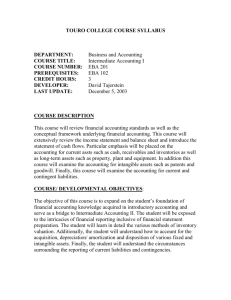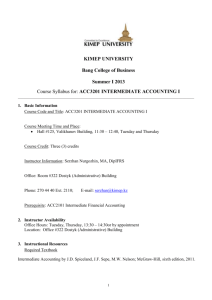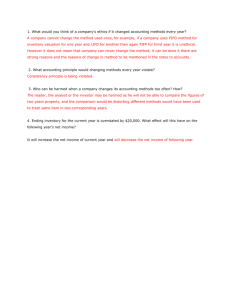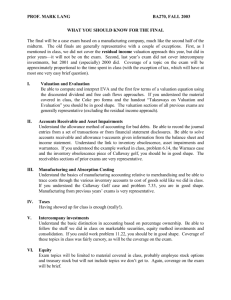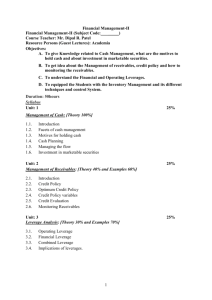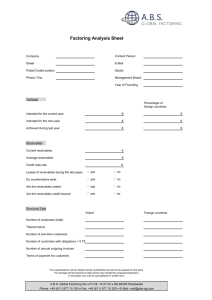Course Outline - East West University
advertisement
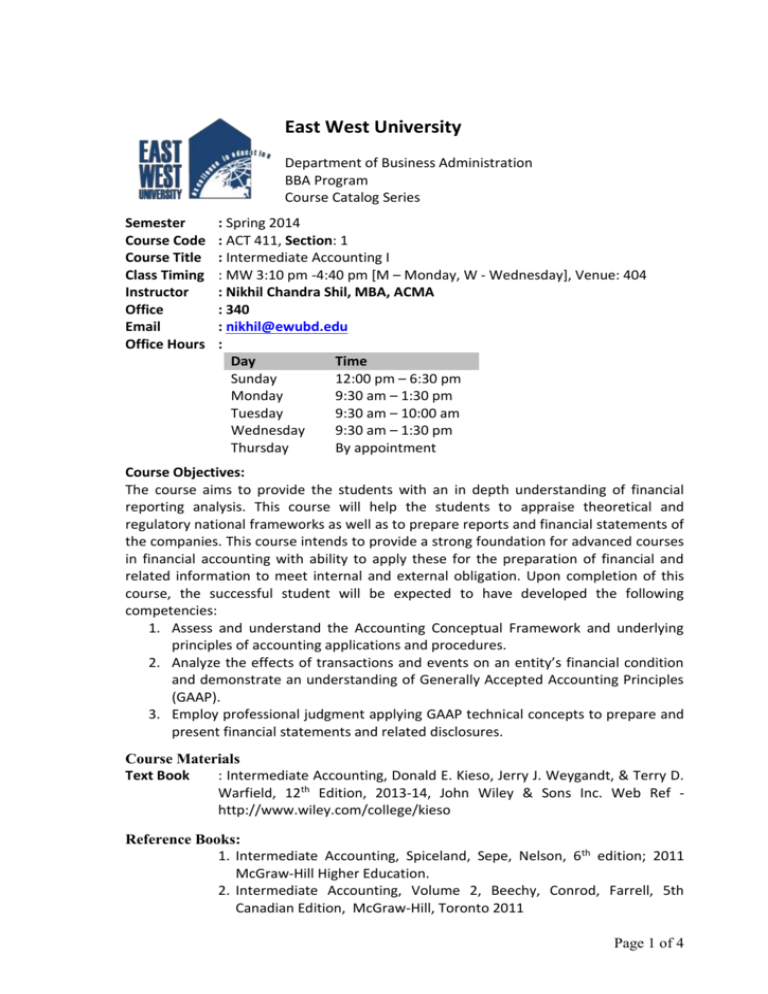
East West University Department of Business Administration BBA Program Course Catalog Series Semester Course Code Course Title Class Timing Instructor Office Email Office Hours : Spring 2014 : ACT 411, Section: 1 : Intermediate Accounting I : MW 3:10 pm -4:40 pm [M – Monday, W - Wednesday], Venue: 404 : Nikhil Chandra Shil, MBA, ACMA : 340 : nikhil@ewubd.edu : Day Time Sunday 12:00 pm – 6:30 pm Monday 9:30 am – 1:30 pm Tuesday 9:30 am – 10:00 am Wednesday 9:30 am – 1:30 pm Thursday By appointment Course Objectives: The course aims to provide the students with an in depth understanding of financial reporting analysis. This course will help the students to appraise theoretical and regulatory national frameworks as well as to prepare reports and financial statements of the companies. This course intends to provide a strong foundation for advanced courses in financial accounting with ability to apply these for the preparation of financial and related information to meet internal and external obligation. Upon completion of this course, the successful student will be expected to have developed the following competencies: 1. Assess and understand the Accounting Conceptual Framework and underlying principles of accounting applications and procedures. 2. Analyze the effects of transactions and events on an entity’s financial condition and demonstrate an understanding of Generally Accepted Accounting Principles (GAAP). 3. Employ professional judgment applying GAAP technical concepts to prepare and present financial statements and related disclosures. Course Materials Text Book : Intermediate Accounting, Donald E. Kieso, Jerry J. Weygandt, & Terry D. Warfield, 12th Edition, 2013-14, John Wiley & Sons Inc. Web Ref http://www.wiley.com/college/kieso Reference Books: 1. Intermediate Accounting, Spiceland, Sepe, Nelson, 6th edition; 2011 McGraw-Hill Higher Education. 2. Intermediate Accounting, Volume 2, Beechy, Conrod, Farrell, 5th Canadian Edition, McGraw-Hill, Toronto 2011 Page 1 of 4 3. Intermediate Accounting, Stice, James; Stice, Earl K.; & Skousen, Fred, 15th Edition, South-Western College Publication. 4. International Accounting Standards-IASB, UK 5. Bangladesh Accounting Standards-ICAB Policy for missed classes, quizzes and midterm examination: Students are requested to attend all the classes and to read assigned textual materials prior to attending the classes. A student missing a significant number of classes without any valid reasons may be dropped from the course. No makeup would be allowed for missed quizzes. Make up of midterm examinations will only be allowed if it is permitted by the Chairperson of the Department. But, the student should sit for the make-up exam within one week of the respective exam date. Code of Conduct for the Students: 1. Students are expected to enter into the classroom within stipulated time. 2. Students must bring the required textbook, calculator and other logistics in the class. 3. Students should maintain the standard class environment. In this regard, activities like side talks, use of cellular phones, frequent in and out from the classroom are strictly prohibited. 4. Students found in any kind of unfair means in the exams will automatically be dropped from the course. 5. Students must abide by all the rules & Regulations of the institution to be allowed to be present in the class / exam halls. Evaluation: Students will be evaluated as per the university guidelines. A tentative marks breakdown is given in the table below. There will be minimum 3 class tests, may be announced or unannounced. Best 2 will be averaged to calculate the marks for class tests. Assignments will be announced by the faculty in due time, may be group or individual. Regularity and active participation in the class is highly expected and solicited. A+ A AB+ B BC+ C CD+ D F GRADING POLICY 97 & above 90- below 97 87- below 90 83- below 87 80- below 83 77-below 80 73-below77 70-below 73 67-below 70 63-below 67 60-below63 Below 60 MARKS DISTRIBUTION Midterm examination 1 Midterm examination 2 Final examination Class quizzes Attendance and Participation Home assignments Total 20% 25% 30% 15% 05% 05% 100% Note: Respective weightage of marks may be modified by the instructor to make the assessment more competitive and participative. Grading Policy University grading policy is applicable as shown in the table above. Page 2 of 4 L E C T U R E P L A N Lecture Details 1 & 2 Accounting Standards and Financial Reporting Financial statements and financial reporting; Parties involved in standard setting: SEC, AICPA, FASB, GASB; Generally accepted accounting principles (GAAP); The expectation gap, International accounting standards, Ethics. Reference Chapter: 1 Text: pp. 1-17 3 Concepts Underlying Financial Accounting Conceptual framework: first level, second level and third level; Objectives; Qualitative characteristics, Elements; Assumptions; Principles; Constraints Chapter-2 Text: pp. 28-46 4&5 Understanding the Accounting Information System Accounting information system; Debits & credits; Basic Equation; Accounting Cycle; Preparation of Financial Statements: income statement, retained earnings statement, balance sheet Chapter-3 Text: pp. 61-93 6&7 Examining the Income Statement Income statement; Format of income statement: single step, multiple-step; Reporting irregular items: discontinued operation, extraordinary items, changes in accounting principles, changes in estimates, correction of errors Chapter – 4 Text: pp. 125 -149 8 9 & 10 Mid Term Examination- 1 Examining the Balance Sheet and Statement of Cash Flows Balance sheet: usefulness, limitations, classification; Additional information reported; Techniques of disclosure; Statement of cash flows: purpose, content and format, preparation, usefulness Chapter-5 Text: pp. 169-198 11 &12 Present Value Concepts and Measurement Basic time value concepts; Single sum problems: present value, future value; Annuities: present value and future value; More complex situations; Present value measurement. Chapter-6 Text: pp. 251-281 13 &14 Understanding Cash And Receivables Cash; Management and control of cash; Reporting cash; Receivables; Recognition of receivables; Valuation of Chapter-7 Text: pp 313-339 Page 3 of 4 accounts receivables; Recognition of notes receivables; Valuation of notes receivables; Disposition of accounts and notes receivables 15 Accounting and Reporting for Inventory: Basics Inventory classification and control; Basic issues in inventory valuation; Physical goods included in inventory; Costs included in inventory; Which cost flow assumption to adopt: specific identification, average cost, FIFO, LIFO. 16 Mid Term Examination- 2 17 &18 Inventories: Valuation and Estimation Concepts Lower of cost or market: ceiling and floor; Valuation basics; Gross profit method of estimating inventory; Retail inventory method; Presentation and analysis. IAS-2: Inventories Chapter-8 Text: pp 368-397 Chapter-9 Text: pp. 422-444 19 &20 Property, Plant and Equipment: Acquisition and Disposition Acquisition and Valuation of Property, Plant and Equipment; Valuation; Cost subsequent to acquisition; Dispositions of plant assets IAS-16:Property, Plant and Equipment Chapter: 10 Text: pp 471-496 21 &22 Property, Plant and Equipment: Cost Allocation and Impairment Depreciation, Methods of depreciation, Impairments, Depletion, presentation and analysis IAS-36: Impairment of Assets Chapter-11 Text: pp 521-545 23 Concepts and Reporting Issues of Intangible Assets Characteristics, Valuation & Amortization of Intangible Assets; Types of Intangible Assets - Marketing related, Customer related, Artistic related, Contract related, Technology related and Goodwill; Impairment of intangible assets, Research and Development cost, Presentation of Intangible Assets. IAS 38: Intangible Assets 24 Final Examination Chapter: 12 Text: pp. 571-594 Page 4 of 4
